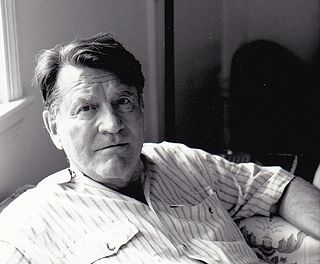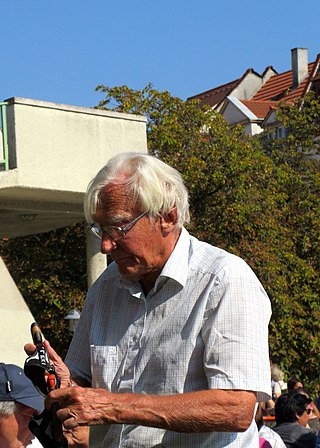Related Research Articles

Gregory Bateson was an English anthropologist, social scientist, linguist, visual anthropologist, semiotician, and cyberneticist whose work intersected that of many other fields. His writings include Steps to an Ecology of Mind (1972) and Mind and Nature (1979).
A double bind is a dilemma in communication in which an individual receives two or more reciprocally conflicting messages. In some scenarios this can be emotionally distressing, creating a situation in which a successful response to one message results in a failed response to the other, such that the person responding will automatically be perceived as in the wrong, no matter how they respond. This double bind prevents the person from either resolving the underlying dilemma or opting out of the situation.

Paul Watzlawick was an Austrian-American family therapist, psychologist, communication theorist, and philosopher. A theoretician in communication theory and radical constructivism, he commented in the fields of family therapy and general psychotherapy. Watzlawick believed that people create their own suffering in the very act of trying to fix their emotional problems. He was one of the most influential figures at the Mental Research Institute and lived and worked in Palo Alto, California.
Second-order cybernetics, also known as the cybernetics of cybernetics, is the recursive application of cybernetics to itself and the reflexive practice of cybernetics according to such a critique. It is cybernetics where "the role of the observer is appreciated and acknowledged rather than disguised, as had become traditional in western science". Second-order cybernetics was developed between the late 1960s and mid 1970s by Heinz von Foerster and others, with key inspiration coming from Margaret Mead. Foerster referred to it as "the control of control and the communication of communication" and differentiated first order cybernetics as "the cybernetics of observed systems" and second-order cybernetics as "the cybernetics of observing systems".

Steps to an Ecology of Mind is a collection of Gregory Bateson's short works over his long and varied career. Subject matter includes essays on anthropology, cybernetics, psychiatry, and epistemology. It was originally published by Chandler Publishing Company in 1972.

Jay Douglas Haley was one of the founding figures of brief and family therapy in general and of the strategic model of psychotherapy, and he was one of the more accomplished teachers, clinical supervisors, and authors in these disciplines.
Systemic therapy is a type of psychotherapy that seeks to address people in relationships, dealing with the interactions of groups and their interactional patterns and dynamics.
Anthony George Wilden was a writer, social theorist, college lecturer, and consultant. Wilden published numerous books and articles which intersect a number of fields, including systems theory, film theory, structuralism, cybernetics, psychiatry, anthropological theory, water control projects, urban ecosystems, resource conservation, and communications and social relations.

Michael White was an Australian social worker and family therapist. He is known as the founder of narrative therapy, and for his significant contribution to psychotherapy and family therapy, which have been a source of techniques adopted by other approaches.
Donald deAvila Jackson, M.D. was an American psychiatrist best known for his pioneering work in family therapy.
The Palo Alto Mental Research Institute (MRI) is one of the founding institutions of brief and family therapy. Founded by Don D. Jackson and colleagues in 1958, MRI has been one of the leading sources of ideas in the area of interactional/systemic studies, psychotherapy, and family therapy.

Mara Selvini Palazzoli (1916–1999) was an Italian psychiatrist and founder in 1971, with Gianfranco Cecchin, Luigi Boscolo and Giuliana Prata, of the systemic and constructivist approach to family therapy which became known as the Milan family systemsapproach and more generally, the school of systemic family therapy. They were variously called the Milan Team or the Milan Associates. Mara Selvini Palazzoli and the Milan Team worked with serious psychiatric disorders in families with anorexic and schizophrenic members.

Personality systematics is a contribution to the psychology of personality and to psychotherapy summarized by Jeffrey J. Magnavita in 2006 and 2009. It is the study of the interrelationships among subsystems of personality as they are embedded in the entire ecological system. The model falls into the category of complex, biopsychosocial approaches to personality. The term personality systematics was originally coined by William Grant Dahlstrom in 1972.
John H. Weakland was one of the founders of brief and family psychotherapy. At the time of his death, he was a senior research fellow at the Mental Research Institute (MRI) in Palo Alto, California, co-director of the famous Brief Therapy Center at MRI, and a clinical associate professor emeritus in the Department of Psychiatry and Behavioral Sciences at the Stanford University School of Medicine.

Cybernetics is a wide-ranging field concerned with circular causal processes such as feedback. The field is named after an example of circular causal feedback—that of steering a ship. In steering a ship, the helmsperson adjusts their steering in continual response to the effect it is observed as having, forming a feedback loop through which a steady course can be maintained in a changing environment, responding to disturbances from cross winds and tide. Cybernetics is concerned with the principles of circular causal processes such as steering however they are embodied, including in ecological, technological, biological, cognitive and social systems and also in the context of practical activities such as designing, learning, managing, etc. Cybernetics' transdisciplinary character has meant that it intersects with a number of other fields, leading to it having both wide influence and diverse interpretations.
Family therapy is a branch of psychotherapy focused on families and couples in intimate relationships to nurture change and development. It tends to view change in terms of the systems of interaction between family members.
First used by Irish-American psychoanalytic psychiatrist Harry Stack Sullivan in the 1940s, Parataxical Integration refers to the mutual condition of parataxic distortions. Parataxical integration exists when two people, usually intimate with each other, are reciprocally reactive to each other’s seductions, judgmental inaccuracies, hostile comments, and manipulations or other "triggering" behaviors. One says or does something causing the other to react, setting off a cyclical "ping-pong", "tit-for-tat", "you-get-me-and-I-get-you-back" oscillation of verbal and/or behavioral reactions.

Richard Fisch (1926–2011) was an American psychiatrist best known for his pioneering work in brief therapy.

The Dream of Reality: Heinz von Foerster's Constructivism is a book by Lynn Segal first published in 1986. Segal, a licensed clinical social worker, examines the constructivist epistemology of physicist and philosopher Heinz von Foerster. Originally intended as a transcription of von Foerster's lectures, the book evolved into Segal's interpretation of von Foerster's constructivism written in everyday language.

Helm Stierlin, born as Wilhelm Paul Stierlin, was a German psychiatrist, psychoanalyst and systemic family therapist. From 1974 to 1991 he was the medical director and chairowner of the Department for psychoanalytic basic research and Family Therapy at the Medical Faculty of the University of Heidelberg. Stierlin contributed significantly to the establishment and further development of systemic therapy in Germany.
References
- ↑ "Archived copy" (PDF). Archived from the original (PDF) on 2019-02-14. Retrieved 2013-04-11.
{{cite web}}: CS1 maint: archived copy as title (link) - ↑ Bateson, G., Jackson, D., Haley, J., & Weakland, J. (1956). Toward a theory of schizophrenia. Behavioral Science, 1, 251-264)
- 1 2 Weakland, John H.; Ray, Wendel (2014). Propagations: Thirty Years of Influence From the Mental Research Institute. London: Routledge. p. 2. ISBN 9781560249368.
- ↑ Gurman, Alan S.; Kniskern, David P. (2014-07-22). Handbook Of Family Therapy. Routledge. ISBN 9781317773054.
- ↑ Metcalf, Linda (2018). Marriage and Family Therapy, Second Edition: A Practice-Oriented Approach. New York: Springer Publishing Company. p. 231. ISBN 9780826161246.